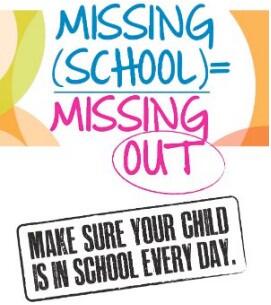Attendance
Every Day Counts!
Attend Today, Achieve Tomorrow!
Did You Know?
- When a child misses just one day of school, it takes two days to catch up.
- When students are not in class they miss important information and instruction.
- Students can still fall behind if they miss just a day or two days every few weeks.
- Being late to school may lead to poor attendance.
- Absences can affect the whole class if the teacher has to slow down learning to help children catch up.
Attending school every day is one of the most important tools for student success. All students need to be in school EVERY DAY, on time, except when they are sick.

Two missed days a month adds up to being a half a year behind by the time your child reaches 4th grade. And once a child falls behind, they rarely catch up.
Tips for Good Attendance

- Set a regular bedtime/curfew on school nights that is appropriate for your child’s age. When lights go out, so should the cell phones, video games and computers.
- Give your child enough time to get ready in the morning. Prepare lunches, pack school bags, and lay out clothing the night before.
- Get your child to school on time, every day, and make sure homework assignments are completed on time.
- Do not support children leaving school early during the school day.
- View tardiness as being unacceptable behavior.
- Schedule all appointments before or after school hours.
- Allow your child to stay home when s/he has a contagious illness or is too sick to be comfortable.
- Notify the school as soon as possible if your child has a prolonged absence due to illness or hospitalization.
- Make sure excuse notes are returned (within three days of the absence) for all absences.
We appreciate your efforts to help your child succeed at school!
When is my child too sick for school?
Here are some guidelines to help determine when your child probably should stay home from school.
- Has a fever of 100 degrees or higher
- Has been vomiting within the last 24 hours
- Eyes with drainage or crusted lids (i.e. pink eye, conjunctivitis)
- Undiagnosed rash
- Has symptoms that prevent him/her from participating in school, such as:
- Excessive tiredness or lack of appetite
- Productive coughing, sneezing
- Headache, body aches, earache
- Sore throat
A minor sore throat is usually not a problem, but a severe sore throat could be strep throat even if
there is no fever. Other symptoms of strep throat in children are headache and stomach upset.
Consult your medical provider to determine if your child needs a special test to see if s/he has strep throat.
The goal of school is to provide an education. Please help us by keeping sick children home and well
children in class EVERY DAY.
If you have any questions, please call your child’s school site office.
Absence Notification
Excused Absences:
-
Due to the child’s illness or due to county/city health officer directed quarantine.
-
For the purpose of obtaining medical, dental, optometrical, or chiropractic services.
-
To attend the funeral services of a member of his or her immediate family
-
For justifiable personal reasons pursuant to uniform standards established by the governing board.
-
For the purpose of spending time with a member of the pupil’s immediate family who is an active duty member of the uniformed services and has been called to duty for, is on leave from, or has immediately returned from deployment. Absences granted pursuant to this paragraph shall be granted for a period of time to be determined at the discretion of the superintendent of the school district.
Short-Term Independent Study Contract
Reporting Absences
Tardies
Truancy

The Laws Concerning School Attendance
All persons between 6 and 18 years of age are required by California law to attend school. Parents have a legal responsibility to ensure their child’s attendance (Ed. Code 48200). A pupil is considered a truant if s/he is absent without a valid excuse three full days in one school year; tardy or absent more than a 30-minute period during the school day without a valid excuse on three occasions in one school year; or any combination thereof (Ed. Code 48260). A student’s refusal to attend school regularly can result in a referral to the School Attendance Review Board (SARB), Juvenile Probation, or the Juvenile Court System (Ed. Code 48263). Parents who fail to compel their child’s attendance may face criminal prosecution and penalties (Ed Code 48291).


.jpg)



